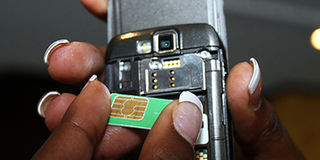Why are roaming charges expensive?

It has proved to be cost effective that while in another country, mobile phone users are better off getting a local line for communication. Internet Photo.
What you need to know:
Although roaming enables a mobile subscriber to automatically make and receive voice calls, send and receive data, or access other services when travelling outside the geographical coverage area of their home network, users decry the exorbitant fees.
Here I am thinking, “Hey I’m on Orange Uganda, let me load Shs30,000 airtime and 150MB data, surely that shall suffice for my two day trip to Kenya. Besides there’s Orange Kenya over there.” Boy, was I mistaken. This thing called roaming is extremely expensive. In fact people who travel a lot know that for every call you make, text you send, or bit that you download while roaming, you pay a lot more. There are arrangements like MTN’s Home and Away available to ease the pain a bit though.
The real deal
So, what is it? Price fixing? Unwarranted regulation? Real expenses? Why does it cost a whole lot more to visit a webpage on your smartphone on one part of the planet than another? The reasons are quite complicated.
Here is the thing. bBefore you jump off a plane in a given country, there is a good chance that your mobile phone will have found its way onto a local network. You may get a text message saying you are now on your network’s foreign partner, or maybe not. Point is, it is very easy to use your phone in another country, and there is almost no functional compromise in doing so.
The number is the same; you can still send texts and connect to the web, works just as it does at home. Pure magic, right? Behind the scenes though, things are more complicated. A call consists of two parts, the voice or data transmission and then an accompanying signal transmission.
When you are overseas, that signal transmission travels a lot farther than the rest of the call. Say you are in Kampala, and you are meeting a friend for lunch. You need to call him and this is what happens, your phone will transmit a signal transmission to your network, which includes information about the phone, length of call, destination number and geographical location.
This signal is passed along to the recipient’s phone as well, to identify the caller. Your phone will transmit a voice signal to your network, which is then routed to the recipient’s network, and then to their phone. The call is connected, the network will know how much call time you have used, and you are charged accordingly. While your voice never leaves your host country, because of the signal transmission, every call you make abroad from a roaming line is charged as an international call.
Why does it cost so much then?
From a technical perspective, making a call abroad is more complicated than making one at home, but not severely so. Roaming is technically supported by mobility management, authentication and billing procedures. It is when you start looking at the commercial arrangements that things get actually hard to make out.
International roaming is built on an inAtconsistent series of contracts, negotiated on a network-by-network basis, totally out of view. So much so that my expectation of Orange Uganda playing nice with Orange Kenya was rendered irrelevant.
If a Ugandan network wants to make sure its customers can use their phones all over the world, they need to ink separate contracts with each and every network they bother to care about across the globe.
If you place a call in another country, what you pay is based almost entirely on what the local network has decided to charge your network as rent so to speak.
By the time your network has finished paying its foreign partner, they already look like they are ripping you off. Your network makes money on your roaming calls, sure, but they are not the reason it hurts so much.
The one force that should keep prices down, competition, often doesn’t exist. Many countries have highly regulated or monopolistic networks, meaning that a Ugandan network looking for a partner might just have one or two choices.
It all comes down to the kind of contract one has. For instance, with MTN, (with their home and away offer), the contract is with Safaricom, a network that is not directly associated with MTN yet Orange Kenya and Orange Uganda, same group companies, charge more for roaming.
If you are going to stay long in a country that offers roaming, you are better off buying a cheap pay-as-you-go phone as soon as you land.
Practices elsewhere
While researching this piece, I found that in the European Union, where businesses, specifically corporations in member countries answer to a central regulatory agency, the European Commission, international roaming charges have actually been capped.
After July 1, anyone hopping between EU member countries with their smartphone is experiencing better roaming charges. Nevertheless most of the solutions to resolve any pricing issues are done through the market, and through competitive means.
Our best hope for cheaper international roaming is a fundamental change in how mobile phones work, which is starting to happen.
Mobile networks are starting to switch more and more to data-based technologies, like VoIP. Customers too are moving to data services like e-mail, Skype, Whatsapp, Viber and Facebook, and never worry about being out of touch.




